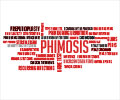Anti-HIV circumcision, a concept researchers are optimistic about, has constantly been dogged by the idea of psychological hurdles that men might face.
Anti-HIV circumcision, a concept researchers are optimistic about, has constantly been dogged by the idea of psychological hurdles that men might face. But new data that was presented at the on-going International AIDS Conference in Mexico City claims that these worries could be tided over.
Encouraging circumcision among men may help curtail the pandemic from spreading further.Post successful trials in Kenya, Uganda and South Africa, researchers have found that circumcision, a process in which the foreskin is removed, more than halves men's risk of HIV infection. The discovery has sparked talk in some circles of a "surgical vaccine" -- a cheap, safe method for shielding men from the human immunodeficiency virus.
Sub-Saharan Africa, home to two-thirds of the 33 million people with HIV, could benefit most, say supporters.
But this enthusiasm has also been tempered by worries that circumcision may face a backlash on cultural, religious or sexual grounds, or may prompt men to abandon use of the condom.
Evidence put forward by US-led researchers at the AIDS conference says that some of these concerns can be eased.
An investigation in Kenya among newly-circumsized men found no increased risk-taking behaviour.
Advertisement
Meanwhile, a study conducted in Zambia by Bailey for the US non-governmental organisation Population Services International (PSI) found that men experienced no pain or sexual dysfunction from circumcision.
Advertisement
The two-year research covered 2,784 men aged between 18 and 24. It compared sexual function between a group of men who were circumsized and another group who would be circumsized later.
Dvora Joseph, acting director of the HIV department at PSI, said the evidence was now mounting that circumcision should play a vital role in the panoply of prevention methods.
"We are asking the international community to help national governments and their partners to introduce male circumcision wherever HIV prevalence is greater and circumcision rates are lower -- in the nations of eastern and southern Africa," she said.
According to French researcher Bertran Auvert, who conducted the original South African study, circumcision could avert up to 3.8 million infections and half a million deaths in sub-Saharan Africa between 2006 and 2016, and up to 5.8 million deaths by 2026.
The theory behind the effectiveness of circumcision is that the inner foreskin is an easy entry point for HIV. It is rich in so-called Langerhans cells, tissue that the AIDS virus finds particularly easy to latch onto and penetrate.
Other questions surrounding a circumcision campaign are the need to ensure that operations are done hygienically and with the full knowledge and consent of the male. Also unclear is what impact male circumcision has on women.
Source-AFP
TAN/L









